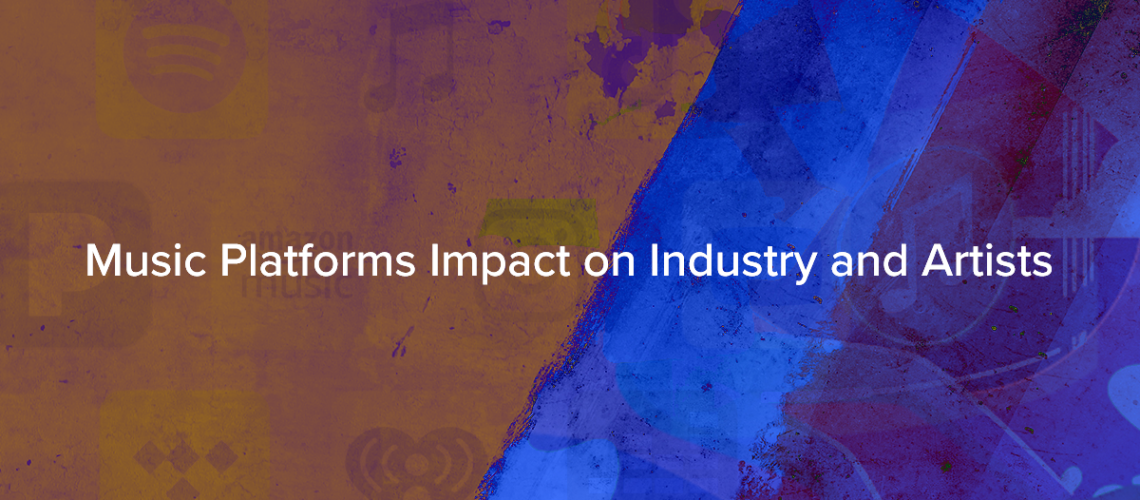The artistic environment is constantly changing and evolving; this includes technological advancements, revenue streams, cultural ideologies, competitive landscapes and more. Such changes are not only exclusive to arts but rather are normal evolution of societies and the human experience in general. The music industry consistent advancement made it easier for artists to emerge, it was inevitable that sustainability issues would rise. In our quest as artists and entrepreneurs to create better opportunities, digital platforms have become a natural and necessary element for artistic growth and promotion. However, a crescendo of concerns suggests that amidst this rise of platforms there is an exploitative undertone in the concentration of power and wealth, diverting towards less harmonious causes. Meanwhile, social media platforms are at the forefront in shaping political opinions and indoctrinating the masses to manufacture consent for wars. A reputable music platform giant was linked to a scandal of using profits from Arts and abandoning its human nobility to support weapon contractors who are behind annihilation of life all over the planet. Another reputable music platform known for their artist-friendly approach, face the tune of acquisition and some say it is only a matter of time that the main platform for independent musicians shall face a fall of such exploitations as well. It has become obvious that the Arts is not immune from the changes and impact of time, and shall not be treated separate from the general human experience. Therefore, leadership in Arts shall consider all aspects of knowledge, including social, historical, organizational and ideological.
The Transformation through Digital Distribution Of Music
The way we interact with music has been fundamentally changed by the digital revolution. With digital transformation, streaming services have unequivocally changed the landscape of music access and discovery, hitting a high note in the convenience for music producers and consumers alike. This innovation has not only challenged old paradigms but also opened up new opportunities for artists and listeners alike.
Understanding the Impact of Digital Distribution on the Music Industry
Once upon a time, music could only reach audiences through physical means (vinyl, cassettes, and CDs); and the digital era has ushered in a more efficient and expansive way to distribute music.
A poignant example of this shift is evident when examining sales data. In the last decade, physical album sales plummeted as consumers have pivoted towards the convenience of digital downloads and streaming services. But due to business orthodoxy and investor culture being prominent in the entrepenaurial world, we see major issues in how artists are being compensated as it became obvious that this technological revolution did not take artist sustainability seriously. The impact of digital on artists is varied in degree depending where artists stand on the spectrum of success and how they define it, but surely it pushed specialization into a blackhole forcing artists to continuously innovate and become multidisciplinary; in no time, what was perceived as the digital progress impacted artists in large numbers into senseless, counter-productive competition that can only be described as cannibalistic competition. This also reduced transcended meaning in art into content, and reduced the artist from a transcended meaningful contributor to society into the “normal” of becoming a content creator seeking self sustainability; and just like that, instead of solving survivalism, industry amplified it. It has become imperative today for artists to abandon shallow constructs of idol and celebrity delusions, and rediscover the importance of principles and values.
Artists Fight Back
The artist is a resourceful creative being made in the image of the ultimate creator; and when considering human history, we learn that power structures are temporal, even when they last for thousands of years. The decline in physical music mediums was overturned by artists who saw them as factors of originality, reintroducing vinyl and other mediums as iconic references to authenticity. Notably, new artist-centric digital platforms are emerging, challenging industry giants and resisting industrial empires.
Artist-Centric Platforms and Self-Distribution Models
Gone are the days when record labels were the sole path to success. Today’s music platform landscape empowers artists to take control of their distribution, independently releasing music worldwide. These artist-centric models allow for a more tailored approach to success in theory. However, the increasing focus on individual artists brings new pressures, necessitating talent diversification and skill acquisition.
Innovating Artist Promotion
The rise of digital platforms provides artists with unprecedented tools for branding and promotion. However, the machine created by humans becomes an extension of their flaws and corruption. Social media platforms, while changing algorithms rapidly, intertwine business and politics, often causing more harm than good to artists.
BeatsUnion: A Solution for Artist Empowerment
In addressing these challenges, a comprehensive solution requires a revolution in thought. BeatsUnion aims to create a sovereign collective based on sovereign individuals, fostering self-governance and sustainability. Developed with Canadian institutional support, BeatsUnion offers a powerful infrastructure for a diverse network of specialized and multidisciplinary artists. BeatsUnion stands as a movement and technology reflecting its principle of sovereignty, offering a unique opportunity for artists to recognize and address common issues (Solving survivalism once and for all) while remaining independent.


